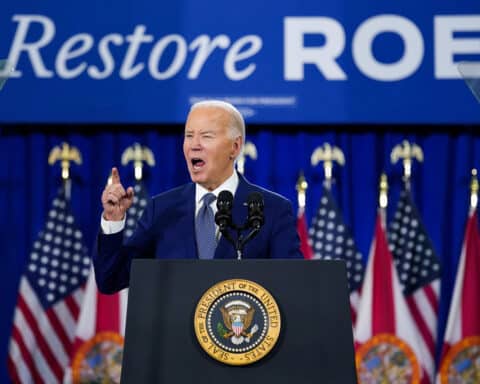In the 49 years since the Supreme Court’s tragic decision in Roe v. Wade that made elective abortions up to the time of fetal viability legal across the country, pro-life advocates who spoke with Our Sunday Visitor say there has never been quite as much optimism in the movement as there is now.
As it weighs the constitutionality of a Mississippi law that effectively bans abortion after 15 weeks of pregnancy, the Supreme Court’s pending ruling in Dobbs v. Jackson Women’s Health Organization will decide whether states have the authority to prohibit abortions before a certain gestational age. If the justices allow the Mississippi law to stand, states across the country would move quickly to protect the unborn.
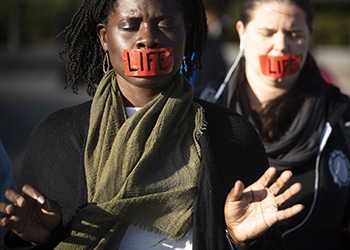
The three justices added during the Trump administration — Neil Gorsuch, Brett Kavanaugh and Amy Coney Barrett — give the court what many believe is a six-justice conservative majority that might weaken the precedents set by Roe and the 1992 decision Casey v. Planned Parenthood that made it illegal for states to create an “undue burden” on women seeking to obtain an abortion.
Michael Kenney, president of Pro-Life Partners Foundation, sees good prospects for the pro-life movement in Dobbs, which will likely be decided sometime in June.
“The Dobbs case presents the Supreme Court with an opportunity to reconsider the justification given for legalizing abortion in 1973 and affirming abortion in 1992 in the Casey decision,” Kenney told Our Sunday Visitor. “(This is) an opportunity to reconsider the grounds for legalizing abortion after nearly 50 years of abortion on demand in the United States.”
| WHAT HAVE POPES SAID ABOUT THE RIGHT TO LIFE? |
|---|
|
“How can an action that ends an innocent and defenseless life in its blossoming stage be therapeutic, civilized or simply human? I ask you: Is it right to ‘do away with’ a human life in order to solve a problem? Is it right to hire a hitman in order to solve a problem? One cannot. It is not right to ‘do away with’ a human being, however small, in order to solve a problem. It is like hiring a hitman.” “Children truly are the family’s greatest treasure and most precious good. Consequently, everyone must be helped to become aware of the intrinsic evil of the crime of abortion. In attacking human life in its very first stages, it is also an aggression against society itself.” “Laws which legitimize the direct killing of innocent human beings through abortion or euthanasia are in complete opposition to the inviolable right to life proper to every individual. … Abortion and euthanasia are thus crimes which no human law can claim to legitimize. There is no obligation in conscience to obey such laws.” “A society that, under various pretexts, moves toward legalized abortion, would be going against the efforts undertaken by centuries of civilization.” “Human life is sacred — all men must recognize that fact. From its very inception it reveals the creating hand of God.” |
Battle in the states
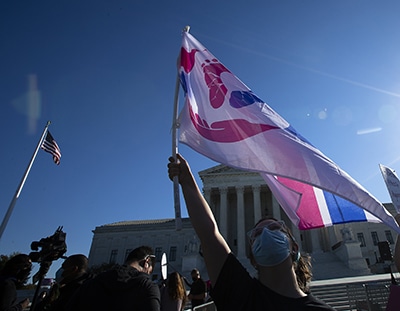
With many court-watchers predicting that the Supreme Court will rule in favor of Mississippi’s law, pro-life organizations across the country are ramping up political action and fundraising, abortion opponents told Our Sunday Visitor with the arguments in Dobbs concluded.
Some pro-life activists and groups with longtime involvement in the abortion fight are talking about new strategies needed in case the legal pendulum swings to their advantage.
The Dobbs case arises from the Gestational Age Act, a 2018 Mississippi law that is currently being blocked by the courts. The U.S. Court of Appeals for the 5th Circuit blocked the law on the grounds that Roe and Casey restrict banning abortions before fetal viability — generally 21 weeks, when the child is expected to have the ability to survive outside his or her mother’s womb. The state asked the Supreme Court to clear the way for the law to be enforced in Mississippi.
In Texas, a relatively new law makes abortion illegal once a fetal heartbeat can be detected, which may be as early as six weeks into a woman’s pregnancy. Before this, elective abortions were allowed up to 20 weeks post-fertilization. The Supreme Court in December decided that abortion providers can challenge the Texas law, but only Texas licensing officials can be sued. The court also ruled that the law will remain in place while legal challenges arise, including the Dobbs case.
Related reading: Archbishop Lori: Dobbs case ‘energizing the movement’ of pro-life advocates
“The fight is becoming more intense at a state level. Fortunately, the pro-life movement saw this coming far ahead of time and is prepared,” Kristan Hawkins, president of Students for Life of America, told Our Sunday Visitor. “Texas, for example, invests $100 million in nonviolent abortion alternatives and resources for women and families — the types of investments pro-abortion legislators and the abortion lobby consistently oppose.”
Students for Life is composed of nearly 1,300 campus groups and more than 130,000 trained young people. The group’s political engagement entails a strategy for the “pro-life generation to solidify our presence city by city,” Hawkins said.
The battle plan is identified as the Campaign for Abortion Free Cities, “which brings pro-life resources and education door to door in more than 20 local communities all over the country. Entrenching this presence in every major city is our goal, and we’re off to a strong start,” Hawkins said.
“With our grassroots presence in all 50 states and strong digital presence, we are reaching concerned Americans and keeping them informed.”
Strategizing
Anticipating the most encouraging development in the 50-year battle against abortion, pro-life forces will likely rely on new strategies to reinvigorate the movement. It’s an uphill battle, as pro-choice groups have outraised pro-life advocates by substantial margins over the last three decades.
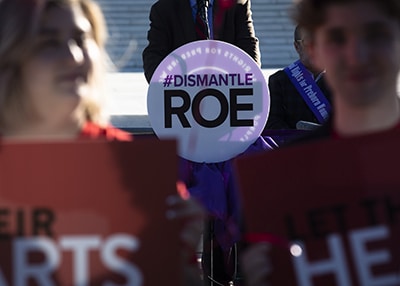
Since 1990, Planned Parenthood has contributed $20.6 million in political contributions to the pro-choice effort and spent $54.3 million. EMILY’s List has topped those numbers. Spending by pro-life organizations has fallen almost every election cycle dating back to 2012, according to reports.
“Fundraising depends upon authenticity. Authenticity addresses the truth of the matter. Concluding the fight has been won before the collapse of legal abortion would be inconsistent with truth,” said Kenney, the president of Pro-Life Partners Foundation. “Benefactors will support authentic efforts to redress injustice.”
“New strategies will emerge from new ways of communicating, and, as with St. John Paul II’s description of the New Evangelization, enduring strategies may be new in ‘ardor, methods and expression,’ but just as the Good News is timeless, so too is truth,” Kenney said.
New strategies depend on the lay of the land in the debate across the country, according to Mary Hallan FioRito, the Cardinal Francis George Fellow at the Ethics and Public Policy Center in Washington, D.C., as well as the director of University of Notre Dame’s deNicola Center for Ethics and Culture.
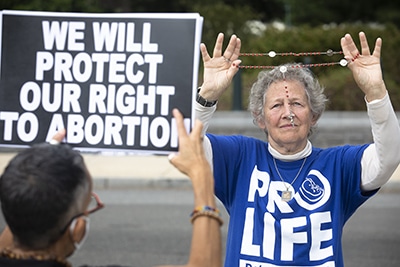
“It is going to depend on state-by-state developments and the results of the midterm elections,” FioRito told Our Sunday Visitor. “The Democrats have overplayed their hand in terms of pushing legislation like tax-payer funded abortions, abortions up until birth, that sort of thing. The American public doesn’t square with abortion extremism.”
However, the prospect of many more state legislatures following the Texas case is slim, FioRito said.
“I doubt very much that a Texas-style law would be a good use of legislators’ time in most states — Texas has specific demographics that aren’t found in many other states,” FioRito said. “Different polls have shown that most Texans support their new law, and it has saved many lives, but its enforcement mechanism has yet to be fully litigated. Until that time, I think many state legislators will take a more cautious approach — one that will gradually build momentum for a country that values and protects unborn human lives.”
A new battlefield
While encouraged by pro-life legislation and its subsequent support in the courts, the decision by the U.S. Food and Drug Administration on Dec. 16 to make so-called “abortion pills” available by mail and prescribed through telehealth medical consultations opens a new battlefield.
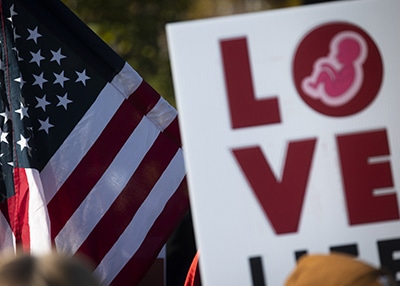
“While the pro-life movement is winning big in state fights, the abortion industry is clinging to chemical abortion pills as the new frontier of abortion in the U.S. and is promoting these drugs to circumvent the pro-life protections put in place through the democratic process in pro-life states,” said Hawkins of Students for Life.
“The FDA is opening the floodgates for ‘death by mail’ operations as the drugs can now be shipped directly to pregnant women’s homes or even ordered by abusers and given to her without her knowledge or consent,” Hawkins said.
“We’ve been very clear that the war is not yet won, and while we embark on a post-Roe America, we are clear-eyed about the battles left ahead of us.”
Joseph R. LaPlante writes from Rhode Island.
| 2022 MARCH FOR LIFE |
|---|
 As they has done every year since the Supreme Court ruled in 1973 that abortion was a constitutionally protected right, pro-life advocates will gather in Washington, D.C., this January to march for the rights of the unborn at the national March for Life. Like those in the past, this year’s march (to be held Jan. 21) will begin near the National Mall and end at the steps of the U.S. Supreme Court — a fitting stopping point given the significant case that stands before the court. The theme of the 2022 march is “Equality Begins in the Womb.” “The pro-life movement recognizes the immense responsibility this nation bears to restore equal rights to its most defenseless citizens in the womb,” March for Life president Jeanne Mancini said at a news conference in October announcing the theme. Anticipation is heightened this year by restrictions placed on abortion availability by court decisions and pro-life inspired state laws, including in Texas where lawmakers essentially have banned the procedure. “Since Roe v. Wade, scientific advances have undeniably confirmed the humanity of the unborn, and today most Americans agree there should be significant limits on abortion,” Mancini said. “To this end, we hope the Supreme Court honors the existing constitutional protections for the unborn as they hear arguments in Dobbs v. Jackson Women’s Health Organization,” she said. Oral arguments concluded in early December. The persistence of the March for Life and the convergence of a growing numbers of marchers of every creed and color, young and old, is proof that abortion remains divisive and “unsettled law,” Mancini contended. “We don’t get smaller, we don’t draw less of a line in the sand, we get bigger every year,” Mancini said. Preparations are underway in towns and cities across America with participants planning their trips to Washington, D.C., finding locations to bed down with their sleeping bags on the floors of school gyms, church basements and meeting halls. The annual event is the essence of a grassroots movement. Organizers of the March for Life also announced that the rally preceding the 2022 march will feature speeches by actor Kirk Cameron and Father Mike Schmitz, host of “The Bible in a Year” podcast and priest of the Diocese of Duluth, Minnesota. The rally will also feature music from Grammy-nominated Matthew West. The 2021 March for Life was held virtually because of the COVID-19 pandemic, at which time vaccines had just begun distribution. For more on this year’s march, visit marchforlife.org. |



